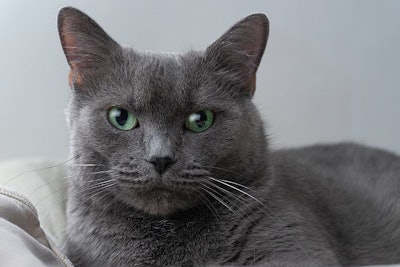
Pet cats may benefit from a dietary supplement and a drug that will both allow the protein AIM (apoptosis inhibitor of macrophage) to properly clean and expel waste matter in a cat's kidneys.
The cat food (named AIM30), which recently came out, and the veterinary medicine, expected in 2023 pending successful 2022 clinical trials and government approval, are the byproducts of Japanese immunologist Professor Toru Miyazaki's decades of work on AIM, a protein which, when not properly activated, contributes to kidney problems in cats.
Miyazaki, a professor specializing in disease biology and immunology at the University of Tokyo’s Graduate School of Medicine, discovered AIM protein in the1990s. His goal was to study AIM to treat human disease, but he also became very interested in feline AIM. He now has plans to leave his teaching career at the University of Tokyo so he can focus on AIM research at the nonprofit he intends to establish, the Institute for AIM Medicine.
Cats and AIM
AIM, also known as CD5-like (CD5L), is described as a secreted protein that can help identify and destroy dead cells and other debris in the body. Miyazaki’s research found that AIM attaches itself to IgM [immunoglobulin M] antibodies and from there proceeds to clean the body of waste and debris.
The AIM-IgM binding affinity, a research article (Impact of feline AIM on the susceptibility of cats to renal disease, October 2016) on Nature.com notes, is 1000-fold higher than that in mice, which is caused by the unique positively charged amino-acid cluster present in feline AIM. When the AIM and IgM don't dissociate, the debris in the cat's system don't get destroyed and cleaned up, Miyazaki said, resulting in a high incidence of cats developing acute kidney injury (AKI) or other renal diseases.
Cat lovers donate to the cause
In September 2021, Miyazaki ran into funding problems because of the COVID-19 pandemic. With the success of feline AIM research at stake, thousands of Japanese cat lovers came to the rescue by sending almost US$2 million in donations to the University of Tokyo so Miyazaki's work could continue.
Realizing the impact his team's work would have on so many lives, Miyazaki tapped a new pharmaceutical company as partner to speed up development of a prototype drug and start a clinical trial for felines with kidney problems. The drug's efficacy will be assessed six months after trial and, if successful, will be subject to government approval.
“I hope that ultimately veterinarians will give (cats) one or two jabs every year like vaccines,” Miyazaki told AFPBB News, the Japanese affiliate of AFP.
Meanwhile, Miyazaki's team and an unnamed pet food company worked to produce a cat food with the AIM protein in stable condition. Miyazaki said what works for humans as far as using dietary supplements with activated AIM protein also works in cats. The cat supplement, which will activate the non-functional AIM in the cat's blood, promises to prevent kidney disease when mixed in cats’ food from the time they’re kittens.
Both the AIM-based therapeutic drug and food supplement for cats are expected to prolong cats' lives by doubling their current life expectancy of roughly 15 years by promoting healthy renal function.
















